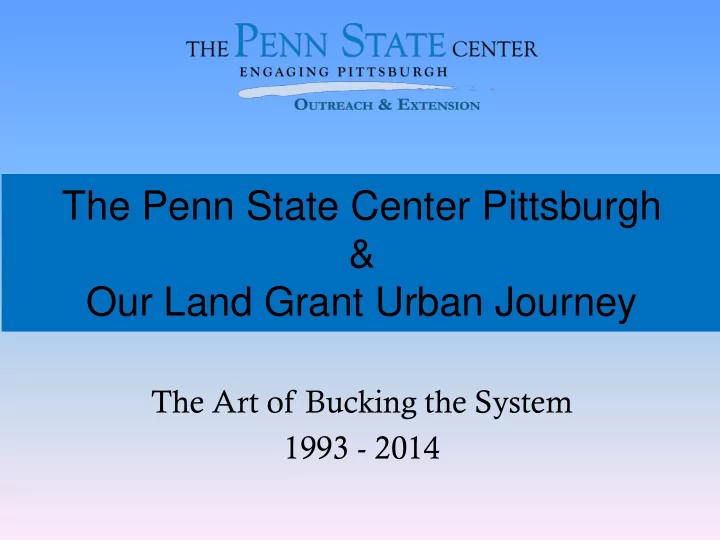

The Penn State Center Pittsburgh & Our Land Grant Urban Journey The Art of Bucking the System 1993 - 2014
Demographics • 1860 - first Morrill Act, 19.8 percent of the U.S. population was considered urban • In 1910 - Smith-Lever Act, 45.6 percent of the population was urban • 2010 census, 80.7 percent of our population is urban. The nation's urban population increased by 12.1 percent from 2000 to 2010, outpacing the nation's overall growth rate of 9.7 percent for the same period. • Today, 1.6% are farmers (what do we count?)
What is Urban • Population Magnitude – Dynamic, complex, diverse, resource rich • Past National Urban Extension Effort Discussions began at 1,000,000 Eventually set at 500,000 • Each State Perceives Urban Uniquely
Penn State Urbanization Timeline 1990 1993 RURAL – URBAN TENSION IN THE LAND GRANT SYSTEM
Penn State Urbanization Timeline 1993 2008 EXPLORE GROWTH OF URBAN EFFORT IN NON-TRADITIONAL PROGRAMS
Penn State Urbanization Timeline 2008 2014 EXPLORE AND IMPLEMENT A METRO RESEARCH AND OUTREACH INITIATIVE
What’s New • Exemplifies 21 st Century Land Grant Mission by establishing urban engaged scholarship and community problem solving • Strong Partnership between Extension and Outreach – Local staff under one leadership • Conduit for exchange of research based practice across the University • A University Wide Effort – Extension Leadership Includes World Campus, credit programming, Engaged Scholarship, and research
Why Should Extension Bother With Urban • Land Grant Obligation to All Residents • Modern Relevance • Steady Funding Decline over Decades • Legislative Power and Numbers are from metropolitan areas ( demographics ) • Access to corporate and foundation funding
Penn State Funding Dynamic • Extension $1.2 base* • Extension Urban Supplement $245,000 • Outreach Support $320,000 • Outreach Space Support $100,000 • Allegheny County $310,000 • Grants & Contracts (2014) $530,000 TOTAL $2,705,000
Pittsburgh Staffing Breakdown • Extension Paid Staff Professional 4.5 Para-Professional 2 • Outreach Professional 2.5 Support 1 Summer Interns 2 • County Support Staff 2 • Grants & Contracts 6 TOTAL 20
Direction Process • Strategic Business Plan Penn State Urban Model Marketing Plan Development Plan Economic Impact Study
The Urban Land Grant Model • Identify an Urban Administrative Leader • Establish an Urban State Extension Team • Establish formal connections with other colleges • Utilize multiple resource/revenue opportunities • Improve connections to local, state and federal government by engaging those in urban areas • Develop local, high level urban Advisory Council • Invest in a sustained operation that is meaningful and consistent in order to build an infrastructure that establishes a functional platform for leveraging local efforts and demonstrates worthiness of public investment.
Center Strategic Goals 1. Design and Implement the New Urban Land Grant Model • Model for Pittsburgh followed by Philadelphia Focus on the needs of the community •
Strategic Goals 2. Use Engaged Scholarship Opportunities to Address Community Needs • Engaged Scholarship Across the University
Strategic Goals 3. Increase Visibility and Recognition Among Key Constituents • Marketing & Branding
Strategic Goals 4. Develop and Implement a Fundraising Strategy to Diversify Revenue
Strategic Goals 5. Facilitate Penn State Presence at the Energy Innovation Center - in the Urban Core
Strategic Goals 6. Support a PSU Applied Research Center at the Energy Innovation Center
Strategic Goals 7. Increase Alumni Involvement with Penn State in Pittsburgh.
Penn State Center Pittsburgh Program Focus Community & Economic Development Community Programs Land Use & Design Energy Economy
Penn State Center Pittsburgh Program Focus Environment & Horticulture Food Systems & Urban Agriculture Stormwater Mitigation Horticulture Environmental Issues
Penn State Center Pittsburgh Program Focus Quality of Life Youth Development Healthfulness The Arts
4 Take A Ways • Champions in Leadership Positions • University recognition that it needs to have a presence in major urban areas • Cross College Collaborations • Extension’s realization that it does not know how but is willing to experiment – long term in urban attention
Recommend
More recommend